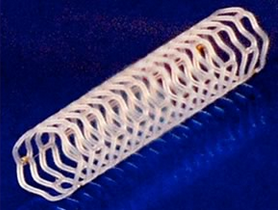October 31, 2013 — Amaranth Medical presented positive six-month angiographic results from its first-in-human
study of its fully bioresorbable stent in patients undergoing percutaneous coronary intervention (PCI) with single coronary lesions.
The Fortitude non-drug eluting bioresorbable scaffold was successfully delivered in 12 patients within the target lesion. Post-deployment angiographic and intravascular ultrasound (IVUS) analysis indicated that the Fortitude scaffold maintained its mechanical integrity, showing no indication of vessel recoil or other structural failures. At the time of the presentation, 10 patients had completed six-month angiographic follow up and six patients had available independent angiographic analysis indicating 0 percent binary restenosis. The data was presented at the "Next generation DES and bioabsorbable scaffolds" session at the Transcatheter Cardiovascular Therapeutics Annual Conference (TCT 2013) on Oct. 27 in San Francisco.
"Short-term failure of bioresorbable
stents is often a result of a device's inability to withstand the biomechanical challenges imposed by the atherosclerotic plaque resulting in recoil and restenosis,” said Kamal Ramzipoor, general manager and chief technical officer, Amaranth. “The Fortitude scaffold has shown high mechanical strength and significant durability during the first six months, which is key to successful vessel remodeling. Importantly, the proprietary materials that provide Fortitude's mechanical integrity also allow it to be entirely bioresorbable, thus potentially restoring vascular physiology reducing the risk of late stent thrombosis and improving long-term clinical outcomes."
Six-month angiographic follow-up data is available on 10 of the 13 patients enrolled in the first cohort and demonstrate excellent biomechanics and biocompatibility of the scaffolds. An independent core laboratory reviewed findings on the first six patients and affirmed that late lumen loss is similar to that observed with bare metal stents. Intravascular ultrasound and optical coherent tomography (OCT) images indicate that the scaffolds are fully opposed to the vessel walls with no indication of recoil or other compromise to their mechanical integrity.
"The rapid evolution of this field has been hampered by the inability to develop thin-strut vascular scaffolds displaying stable long-term biomechanical behavior,” said Juan Granada, M.D., executive director and chief scientific officer, Cardiovascular Research Foundation (CRF) Skirball Research Center and primary investigator, Amaranth first-in-human study. “This early human experience confirms both the positive biocompatibility profile of the polymer and biomechanical properties of this device in the absence of drug elution. From our experience to date, we are optimistic that the next generation of the Fortitude technology will permit further miniaturization of the strut but still provide the necessary balance between mechanical strength and bioresorption."
For more information: amaranthmedical.com


